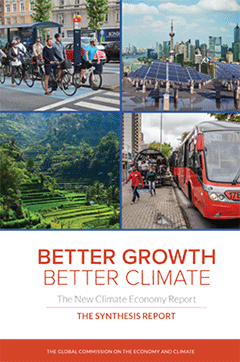|
A major new report from the Global Commission on the Economy and Climate argues that countries at all levels of income now have the opportunity to build lasting economic growth at the same time as reducing the immense risks of climate change, but they must act now. The Global Commission on the Economy and Climate comprises 24 leaders from government, business, finance and economics in 19 countries. A year-long study has been conducted by leading research institutes from Brazil, China, Ethiopia, India, South Korea, the United Kingdom and United States, advised by a panel of world-leading economists chaired by Lord Nicholas Stern. Better Growth, Better Climate: The New Climate Economy Report was presented to governments and business and finance leaders at a global launch event at the UN headquarters in New York City 16 September 2014, attended by United Nations Secretary General Ban Ki-moon. The report arrives just one week before the UN Climate Summit. The report finds that over the next 15 years, about US $90 trillion will be invested in infrastructure in the world’s cities, agriculture and energy systems. The world has an unprecedented opportunity to drive investment in low-carbon growth, bringing multiple benefits including jobs, health, business productivity and quality of life. “The messages from this landmark report are clear and unambiguous: there are real and available alternatives to the bad policies that are destroying our future. The report makes a compelling case that decisive but urgent shifts in policies and behaviour can deliver (equitable) economic growth while grappling climate change. This must imply real changes, not only in national and international policies, but ultimately in the patterns of daily life, at the level where people live,” said Cities Alliance Director William Cobbett in the report's press release. The crucial role of cities The report also features a chapter on cities, which are crucial to economic growth and climate action. Its main messages are:
A global action plan Better Growth, Better Climate sets out a detailed 10-point Global Action Plan of practical recommendations that can achieve greater prosperity and a safer climate at the same time. These measures will all lead to net benefits to the economy, even before their climate benefits are considered. The Commission calculates that if fully implemented its recommendations could potentially achieve up to 90% of the emissions reductions needed by 2030 to avoid dangerous climate change. This would require decisive and early action by economic decision makers. Over the next six months the Commission will discuss the report with economic decision makers across the world. It aims to stimulate stronger action by governments and businesses to drive growth and emissions reductions together. As Commission Chair Felipe Calderon said in the press release: “The message to leaders is clear. We don’t have to choose between economic growth and a safe climate. We can have both. We can choose better growth and a better climate.” |

|




